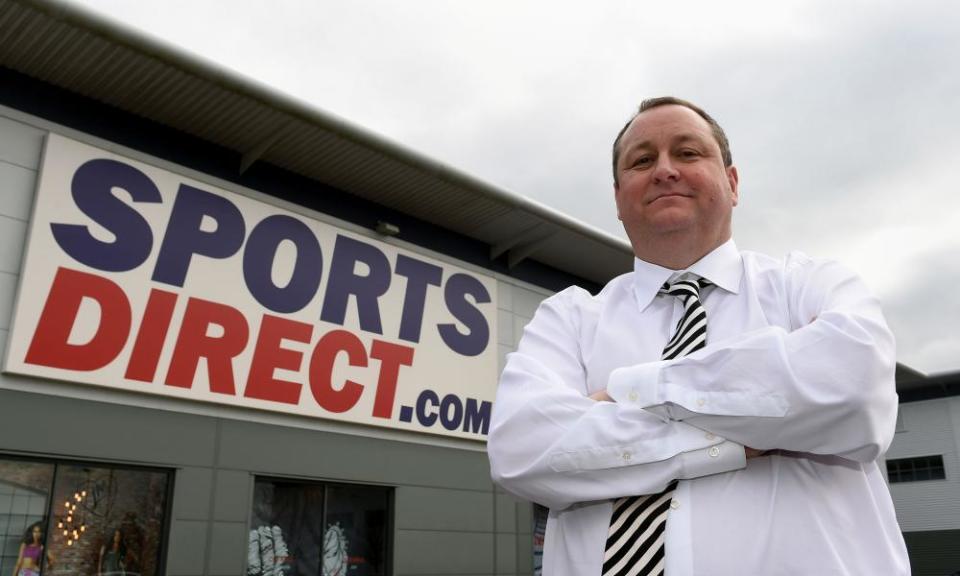Sports Direct's French Connection flutter looks like a fashion faux pas | Nils Pratley

Sports Direct’s Mike Ashley and French Connection’s Stephen Marks both don’t enjoy being told how to run their business. Thus excellent entertainment could be in prospect now that Sports Direct has bought control of an 11% stake in the struggling fashion chain.
Marks, who owns 42% of French Connection, is already sparring with a hedge fund that thinks he shouldn’t be both chairman and chief executive of a company that has made losses for five years in a row. Ashley’s arrival in the ring makes the script more unpredictable. Read nothing into French Connection’s statement that it sees the purchase “as a vote of confidence in the true potential of our company”. Ashley is not a sit-and-hold merchant.
But, while we sit back and await developments, Sports Direct’s outside shareholders may not be so relaxed. Ashley is supposed to be running a sportswear retailer, not a speculative investment fund. He owns 56% of Sports Direct but the owners of the other 44% are quite capable of forming their own view of French Connection’s prospects. The funds for this adventure are the company’s, not Ashley’s, remember.
He’s done this sort of thing in the past – everywhere from Tesco to House of Fraser to Debenhams. The (thin) justification is usually that the “investments” somehow serve Sports Direct’s broader strategic aims. At a push, one could construct an elaborate theory that a relationship with French Connection could help Sports Direct to get bigger in fashion. But, come on, you don’t need to buy a big block of loose shares to open a commercial discussion.
It seems more likely that Ashley simply can’t resist a flutter when he spies a lively situation. It’s almost as if he has heard the objections to past share-buying adventures, plus shareholders’ multiple other governance worries, and decided to send a message that he doesn’t give a fcuk.
Will baby milk suit Nurofen maker Reckitt?
If your shares have performed like Reckitt Benckiser’s – £24 to £71 in the past decade – investors are inclined to smile on any big proposed acquisition. Sure enough, the share price improved 4% as Reckitt said it is in advanced discussions to buy Mead Johnson Nutrition, a US baby milk firm, for $16.7bn (£13.3bn) in cash. But isn’t this a very un-Reckitt-like deal?
One could say that baby milk falls within Reckitt’s “consumer healthcare” bucket, even if the current infant-related range seems to run to little more than the kiddie formulation of Nurofen. Or perhaps the appeal of Mead is the fact that it’s big in China and the rest of Asia, territory that all consumer goods giants are inclined to want to populate.
But, at $16.7bn, plus a billion if you include Mead’s borrowings, this deal would be a major departure from Reckitt’s old diet of small purchases that can be slotted seamlessly into a reliable distribution network. Nurofen, Durex condoms and the Scholl footwear brand fitted that bill. With baby milk, Reckitt would be up against the commanding marketing budgets of Nestlé and Danone.
Then there is the proposed takeover price of $90 a share. Mead expects to earn $3.05-$3.20 a share in 2017, so Reckitt would be paying about 29 times earnings, which is enormous. It would be easier to justify if the target was growing rapidly or carrying fat. But Mead’s sales, measured at constant currencies, fell 3% last year, and were even down in Asia. Profit margins are already 24%, which doesn’t obviously suggest inefficiency.
Rakesh Kapoor, Reckitt’s chief executive, has been warming up his investors for a big move for a while but they thought he had in mind an unloved consumer healthcare division of a big pharmaceutical firm. Mead isn’t that, and yet Reckitt is seemingly happy to push its own borrowing ratios to the maximum to buy it.
It all suggests Kapoor failed to find what he really wants to buy and has settled for second-best. When he is free to speak, he will offer counter-arguments, but investors’ lack of initial scepticism is odd. Just because it’s Reckitt, it doesn’t mean the deal must be brilliant.
AstraZeneca’s Brexit dose
Aren’t our big pharmaceutical firms meant to be depressed about Brexit and the prospect of the European Medicines Agency (EMA), the pan-EU regulator, moving out of London?
Pascal Soriot, chief executive of AstraZeneca, didn’t exactly sound excited but he made a couple of interesting points about the EMA’s departure, which he views as inevitable. First, it will be important for the new UK body and EMA to work collaboratively. “That should be possible because it is in the interests of everybody and all the regulatory and scientific standards today are common,” he said.
Second, he argued the UK could be more “agile” in encouraging innovation. “If it’s done well, it could be helpful,” he said. That is a qualified remark but it is another welcome sign of pragmatism on Brexit from British business. It’s the only way, unfortunately.

 Yahoo Finance
Yahoo Finance 